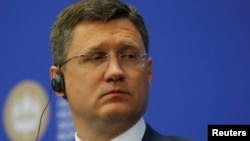Moscow and Kiev envoys met Tuesday in Berlin for EU-backed talks on future Russian gas shipments through Ukraine, which fears being left out in the cold by a major new pipeline.
Ukraine is anxious that the planned Nord Stream 2 Baltic Sea pipeline from Russia to Germany that will bypass it geographically will also leave it politically isolated and deprive it of crucial transit fees.
US President Donald Trump has weighed in on the dispute, charging the pipeline would increasingly make Germany a "captive of Russia" while vowing the United States will compete in Europe with tankerloads of liquified natural gas (LNG).
Russia's state-controlled gas giant Gazprom has already dramatically cut the volume of gas transiting via Ukraine, where an armed conflict has simmered against pro-Moscow rebels since Russia's 2014 annexation of Crimea.
Gazprom and its partners plan to complete by late next year Nord Stream 2 — effectively doubling Russian shipments now flowing through the existing Nord Stream 1 line.
Another project set for completion by late 2019, the Turkish Stream pipeline, threatens to further reduce the traditional role of Ukraine as a major gateway into Europe for Russian gas.
The Nord Stream 2 plan has raised fears in the EU, and especially in eastern Europe, of excessive reliance on gas from a hostile Russia that could use energy exports for political leverage.
In past disputes, Russian supplies to European markets were temporarily shut off in 2006 and 2009, at times in mid-winter.
'Clock is ticking'
The Berlin talks brought together Russian Energy Minister Alexander Novak, Ukrainian Foreign Minister Pavlo Klimkin and the European Commission vice president for energy Maros Sefcovic, as well as executives from Gazprom and its Ukrainian counterpart Naftogaz.
"The clock is ticking, the end of 2019 is around the corner, and we need to answer this question," said Sefcovic. "Will we have a meaningful agreement on January 1, 2020 for transit through Ukraine that is commercially viable?"
Trump last week weighed into the dispute and attacked Chancellor Angela Merkel by charging that NATO ally "Germany is captive of Russia because it is getting so much of its energy from Russia."
During his Helsinki meeting Monday with Russian President Vladimir Putin, Trump reiterated that the US, thanks to its fracking energy boom, could increasingly compete in Europe by selling LNG.
Although LNG shipped across the Atlantic is less economically viable, Trump voiced hope that "we'll compete successfully," while conceding that Russia had "a little advantage location-wise."
Putin was conciliatory, saying Russia was ready to keep up transit via Ukraine after Nord Stream 2 becomes operational and extend the transit agreement beyond 2019.
The Russian leader added that this would be possible if Gazprom and Naftogaz resolve their gas dispute at a Stockholm arbitration court.
'Mistrust, complaints'
Germany, the biggest EU economy, has long insisted Nord Stream 2 is a purely "commercial" project and in March lifted the final obstacles to its construction.
However, under rising pressure from Western allies, Merkel in April stressed that Ukraine must not be isolated and should continue to play a key role in the transit of gas to Europe.
Merkel's Economy Minister Peter Altmaier said the goal of Tuesday's talks was working toward "a long-term, reliable solution that serves the interests of both sides and especially meets the security concerns of Ukraine."
"It has not been easy for Ukraine to negotiate with Russia, especially since 2014," he said, adding that there had been "a lot of mistrust and complaints".
Ukrainian President Petro Poroshenko has in the past urged Germany to abandon plans to build Nord Stream 2, warning it would amount to an "economic and energy blockade" of his crisis-torn country.
European demand for gas has been rising since 2015, largely because of a drop in production in the Netherlands.
Russia, with its vast Siberian gas fields, has the world's largest natural gas reserves, and last winter Gazprom raised exports to Europe to a record high amid especially cold weather.





